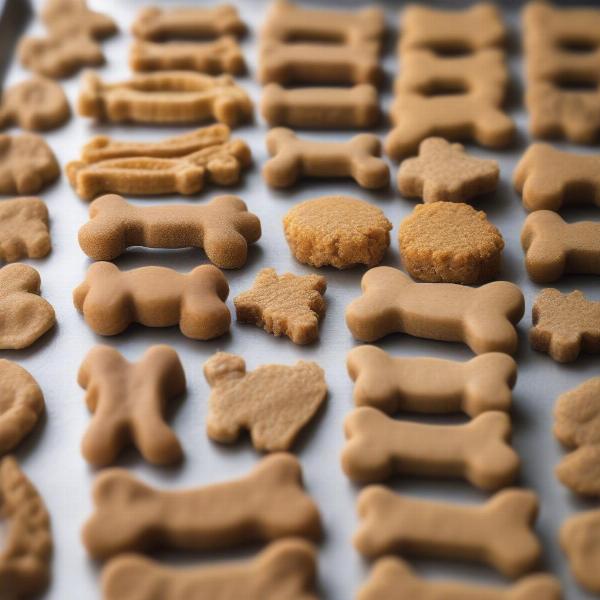Small dog breeds have specific dietary needs, and choosing the right small dog dog treats is crucial for their health and happiness. This guide will delve into the world of small dog dog treats, covering everything from nutritional requirements to training tips, ensuring you make the best choices for your petite companion.
Understanding Your Small Dog’s Nutritional Needs
Just like humans, small dogs require a balanced diet to thrive. Their smaller stomachs mean they need more calorie-dense foods, but those calories should come from nutritious sources, not just fillers. When choosing small dog dog treats, look for options that are high in protein and essential nutrients, while being low in unhealthy fats and artificial ingredients. Consider treats specifically formulated for small breeds, as they often cater to their unique metabolic needs and smaller mouths.
Choosing the Right Size and Texture
Small dog dog treats should be appropriately sized for your dog’s tiny mouth. Large treats can be choking hazards and difficult for them to chew. Look for bite-sized treats or easily breakable options. The texture of the treat is also important. Some small dogs prefer softer treats, especially senior dogs or those with dental issues, while others enjoy a satisfying crunch. Offer a variety to see what your furry friend prefers.
Using Treats for Training and Positive Reinforcement
Small dog dog treats are invaluable for training. Their small size allows for multiple rewards without overfeeding, making them perfect for reinforcing desired behaviors. Use positive reinforcement techniques, rewarding your dog immediately after they perform the desired action. Consistency is key to successful training, so always reward good behavior with a small, tasty treat.
Best Treats for Small Dogs
There are numerous types of small dog dog treats available. Some popular and healthy options include:
- Freeze-dried treats: These are often single-ingredient treats, like meat or fish, retaining much of their nutritional value.
- Soft chews: Ideal for senior dogs or those with dental issues.
- Training treats: These are typically small and low in calories, perfect for rewarding good behavior during training sessions.
- Dental chews: Help maintain oral hygiene by scraping away plaque and tartar.
Homemade Treats for Small Dogs
Making your own small dog dog treats allows you to control the ingredients, ensuring they are healthy and safe for your pet. Simple recipes using ingredients like sweet potato, pumpkin, or lean meat can be easily made at home. Always ensure you research safe ingredients for dogs before experimenting with homemade treats.
 Homemade dog treats for small dogs
Homemade dog treats for small dogs
Avoiding Harmful Ingredients
When selecting small dog dog treats, avoid those containing artificial colors, flavors, preservatives, and sweeteners. Xylitol, a common artificial sweetener, is particularly toxic to dogs, even in small amounts. Always carefully read the ingredient list before purchasing any treats.
Conclusion
Choosing the right small dog dog treats is a vital aspect of responsible pet ownership. By focusing on nutrition, size, and ingredients, you can ensure your small dog receives healthy and enjoyable rewards that contribute to their overall well-being. Remember to always consult with your veterinarian if you have any concerns about your dog’s diet or specific dietary needs.
FAQ
- How many treats can I give my small dog per day? Treats should not make up more than 10% of your dog’s daily caloric intake. Always consult your veterinarian for specific recommendations.
- What are some signs of a food allergy in small dogs? Signs can include itchy skin, digestive issues, and ear infections.
- Can I give my small dog table scraps? While some human foods are safe for dogs, many are not. Stick to specifically formulated dog treats.
- Are dental chews effective for small dogs? Yes, dental chews can help maintain oral hygiene, but they should not replace regular brushing.
- What should I do if my small dog chokes on a treat? Seek immediate veterinary attention.
- Are grain-free treats better for small dogs? Not necessarily. Some dogs thrive on grain-free diets, while others do not. Consult your veterinarian.
- How can I store homemade dog treats? Store them in an airtight container in the refrigerator or freezer.
ILM Dog is a leading international pet website dedicated to providing expert advice and resources on all aspects of dog care and wellbeing. From breed selection and health advice to training tips and nutritional guidance, we are committed to helping you navigate the joys and responsibilities of dog ownership. We offer comprehensive information on everything from puppy care to senior dog needs, ensuring your furry friend thrives at every stage of life. For expert advice and a wide range of products and accessories, contact us at [email protected] or call us at +44 20-3965-8624. Visit ILM Dog for more information.